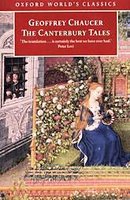
by Geoffrey Chaucer
Written in the late 14th century by the man who many consider to be the father of the English language, the Canterbury Tales is a collection of stories told by various pilgrims on a holy pilgrimage to Canterbury. Their host (or guide) suggests a contest to keep them entertained along their journey: each member of the pilgrimage will tell two tales and then they will judge whose was best. Chaucer never finished this work, which is apparent by the fact that most of the members never tell both of their tales, but there are still dozens of tales (most written in rhyming verse) which provide an interesting peek into Chaucer's world. The tales are told by a variety of different people belonging to a variety of different classes and they range from the bawdy to the downright boring.
The Canterbury Tales is an important piece of English literature because it was written at a time when English was a young language and it had a huge influence on shaping the language for works that came after it. The language used later by Shakespeare and in the King James Bible owes much to the language found in Chaucer's work, and indeed isn't too far removed from it.
I found the Canterbury Tales to be interesting from a historical perspective but all in all, it's a pretty difficult read. Many people will find the language difficult but for me, having grown up reading the King James Bible and being pretty comfortable with Shakespeare, the main difficulty wasn't the language at all. The main difficulty for me was that a goodly portion of it is really quite dull reading. Still, it's fascinating to me that more than six and a half centuries later, mankind still struggles with many of the same issues: love, hate, religion, sex, dishonesty, and so on.
 by Yann Martel
by Yann Martel


